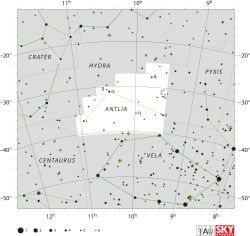Iota Antliae

| |
| Observation data Epoch J2000 Equinox J2000 | |
|---|---|
| Constellation | Antlia |
| Right ascension | 10h 56m 43.05206s[1] |
| Declination | –37° 08′ 15.9552″[1] |
| Apparent magnitude (V) | +4.60[2] |
| Characteristics | |
| Spectral type | K1 III[3] |
| U−B color index | +0.84[2] |
| B−V color index | +1.03[2] |
| Astrometry | |
| Radial velocity (Rv) | –0.2[4] km/s |
| Proper motion (μ) | RA: +76.14 ± 0.19[1] mas/yr Dec.: –124.43 ± 0.13[1] mas/yr |
| Parallax (π) | 17.16 ± 0.19[1] mas |
| Distance | 190 ± 2 ly (58.3 ± 0.6 pc) |
| Absolute magnitude (MV) | +0.77 |
| Other designations | |
Iota Antliae (ι Ant, ι Antliae) is the Bayer designation for a star in the southern constellation of Antlia. It has an apparent visual magnitude of +4.60,[2] making it a faint naked eye star. From parallax measurements, the distance to this star can be estimated as 190 light-years (58 parsecs).[1] The spectrum of Iota Antliae matches a stellar classification of K1 III,[3] indicating that this is an evolved star that is now in its giant phase. It is a core helium fusing star that is classified as a member of the red clump evolutionary branch.[6]
References
- 1 2 3 4 5 6 van Leeuwen, F. (November 2007), "Validation of the new Hipparcos reduction", Astronomy and Astrophysics, 474 (2): 653–664, arXiv:0708.1752
 , Bibcode:2007A&A...474..653V, doi:10.1051/0004-6361:20078357.
, Bibcode:2007A&A...474..653V, doi:10.1051/0004-6361:20078357. - 1 2 3 4 Johnson, H. L.; et al. (1966), "UBVRIJKL photometry of the bright stars", Communications of the Lunar and Planetary Laboratory, 4 (99), Bibcode:1966CoLPL...4...99J.
- 1 2 Houk, Nancy (1979), Michigan catalogue of two-dimensional spectral types for the HD stars, 3, Ann Arbor, Michigan: Dept. of Astronomy, University of Michigan, Bibcode:1982mcts.book.....H.
- ↑ Wielen, R.; et al. (1999), Sixth Catalogue of Fundamental Stars (FK6). Part I. Basic fundamental stars with direct solutions (35), Astronomisches Rechen-Institut Heidelberg, Bibcode:1999VeARI..35....1W.
- ↑ "iot Ant -- Star", SIMBAD Astronomical Object Database, Centre de Données astronomiques de Strasbourg, retrieved 2012-06-29.
- ↑ Kubiak, M.; et al. (June 2002), "Metal Abundance of Red Clump Stars in Baade's Window", Acta Astronomica, 52: 159–175, Bibcode:2002AcA....52..159K.
This article is issued from Wikipedia - version of the 10/26/2016. The text is available under the Creative Commons Attribution/Share Alike but additional terms may apply for the media files.